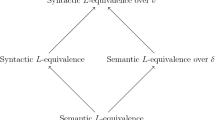Abstract
Earman (1993) distinguishes three notions of empirical indistinguishability and offers a rigorous framework to investigate how each of these notions relates to the problem of underdetermination of theory choice. He uses some of the results obtained in this framework to argue for a version of scientific anti- realism. In the present paper we first criticize Earman's arguments for that position. Secondly, we propose and motivate a modification of Earman's framework and establish several results concerning some of the notions of indistinguishability in this modified framework. Finally, we interpret these results in the light of the realism/anti- realism debate.
Similar content being viewed by others
REFERENCES
Bennett, C.: 1986, On Some Orderings of Extensions of Arithmetic, Doctoral Dissertation, Department of Philosophy, University of Göteborg.
Earman, J.: 1992, Bayes or Bust? A Critical Examination of Bayesian Confirmation Theory, MIT Press, Cambridge, MA.
Earman, J.: 1993, ‘Underdetermination, Realism and Reason’, Midwest Studies in Philosophy XVIII, 19–38.
Field, H.: 1980, Science without Numbers: A Defense of Nominalism, Princeton University Press, Princeton, NJ.
Hoefer, C. and A. Rosenberg: 1994, ‘Empirical Equivalence, Underdetermination, and Systems of the World’, Philosophy of Science 61, 592–607.
Kelly, K.: 1992, ‘Learning Theory and Descriptive Set Theory’, Logic and Computation 3, 27–45.
Kelly, K.: 1996, The Logic of Reliable Inquiry, Oxford University Press, New York.
Kelly, K. and C. Glymour: 1989, ‘Convergence to the Truth and Nothing but the Truth’, Philosophy of Science 56, 185–220.
Kelly, K. and O. Schulte: 1995, ‘The Computable Testability of Theories with Uncomputable Predictions’, Erkenntnis 43, 29–66.
Kukla, A.: 1996, ‘Does Every Theory Have Empirically Equivalent Rivals?’, Erkenntnis 44, 137–166.
Laudan, L. and J. Leplin: 1991, ‘Empirical Equivalence and Underdetermination’, Journal of Philosophy 88, 449–473.
Leeds, S.: 1994, ‘Constructive Empiricism’, Synthese 101, 187–221.
Leplin, J.: 1997, ‘The Underdetermination of Total Theories’, Erkenntnis 47, 203–215.
Rogers, H.: 1967, Theory of Recursive Functions and Effective Computability, MIT Press, Cambridge, MA.
Shapiro, S.: 1991, Foundations without Foundationalism. A Case for Second-Order Logic, Oxford University Press, Oxford.
van Fraassen, B.: 1980, The Scientific Image, Clarendon Press, Oxford, UK.
Author information
Authors and Affiliations
Rights and permissions
About this article
Cite this article
Douven, I., Horsten, L. Earman on Underdetermination and Empirical Indistinguishability. Erkenntnis 49, 303–320 (1998). https://doi.org/10.1023/A:1005437217700
Issue Date:
DOI: https://doi.org/10.1023/A:1005437217700



